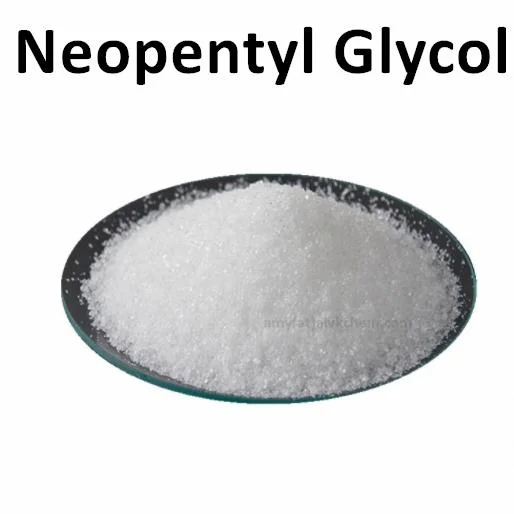Einführung
Das Verständnis der Siedetemperatur von Neopentylglykol ist für Branchen, die auf diese vielseitige Verbindung angewiesen sind, von der Herstellung von Harzen bis zur Formulierung von Beschichtungen und Weichmachern, von entscheidender Bedeutung. Die Siedetemperatur von Neopentylglykol beeinflusst seine Leistung in verschiedenen Anwendungen und wirkt sich auf Faktoren wie Reaktionskinetik, Verdampfungsraten und Produktqualität aus. In diesem Blog erforschen wir die Wissenschaft hinter der Siedetemperatur von Neopentylglykol, untersuchen die Schlüsselfaktoren, die sie beeinflussen, und warum sie für die Optimierung industrieller Prozesse entscheidend ist.
Was ist Neopentylglykol?

Chemische Struktur und Eigenschaften
Neopentylglykol mit der chemischen Formel C5H12O2 ist eine organische Verbindung, die zur Klasse der Diole gehört. Es zeichnet sich durch seine verzweigte Struktur aus, die zwei Hydroxylgruppen umfasst, die an ein zentrales Kohlenstoffatom gebunden sind. Diese einzigartige Konfiguration verleiht Neopentylglykol seine außergewöhnliche thermische Stabilität, wodurch es selbst bei erhöhten Temperaturen äußerst widerstandsfähig gegen Oxidation und Zersetzung ist.
Anwendungen von Neopentylglykol
Neopentylglykol wird häufig zur Herstellung von folgenden Produkten verwendet:
- Alkydharze: Aufgrund seiner Hydrolysebeständigkeit wird Neopentylglykol häufig bei der Herstellung von Hochleistungsalkydharzen für Farben und Beschichtungen verwendet.
- Polyester: Es dient als wichtiger Bestandteil bei der Herstellung von Polyesterharzen, die in zahlreichen Anwendungen zum Einsatz kommen, unter anderem in Autolacken, Möbeloberflächen und Weichmachern.
- Weichmacher: Neopentylglykol wird bei der Herstellung von Weichmachern verwendet, die Kunststoffen zugesetzt werden, um deren Flexibilität und Haltbarkeit zu erhöhen.
- Schmierstoffe: Seine chemische Stabilität macht es zu einem idealen Bestandteil in synthetischen Schmierstoffen, die hohen Temperaturen ausgesetzt sind.
Angesichts seines breiten Anwendungsspektrums ist die Kenntnis der Siedetemperatur von Neopentylglykol von entscheidender Bedeutung für die Optimierung seiner Verwendung in diesen Branchen.
Die Siedetemperatur von Neopentylglykol verstehen
Definition und Bedeutung
Die Siedetemperatur einer Substanz ist die Temperatur, bei der sie sich bei einem bestimmten Druck, normalerweise Atmosphärendruck (1 atm), von einer Flüssigkeit in ein Gas verwandelt. Für Neopentylglykol ist die Siedetemperatur ein kritischer Parameter, der sein Verhalten während der Verarbeitung und Anwendung beeinflusst. Die Kenntnis der genauen Siedetemperatur von Neopentylglykol hilft Herstellern und Ingenieuren bei der Entwicklung von Prozessen, die Effizienz und Produktqualität maximieren.
Faktoren, die die Siedetemperatur beeinflussen
Die Siedetemperatur von Neopentylglykol kann durch mehrere Faktoren beeinflusst werden, darunter:
- Reinheit der Verbindung: Verunreinigungen in Neopentylglykol können dessen Siedetemperatur verändern. Eine höhere Reinheit führt normalerweise zu einer gleichmäßigeren und vorhersehbareren Siedetemperatur.
- Atmosphärischer Druck: Wie bei allen Flüssigkeiten variiert die Siedetemperatur von Neopentylglykol mit dem Luftdruck. In größeren Höhen, wo der Druck niedriger ist, siedet Neopentylglykol bei einer niedrigeren Temperatur.
- Vorhandensein anderer Substanzen: Wenn Neopentylglykol mit anderen Chemikalien gemischt wird, kann seine Siedetemperatur aufgrund von Wechselwirkungen zwischen Molekülen beeinflusst werden.
Messung der Siedetemperatur von Neopentylglykol
Labormethoden
Um die Siedetemperatur von Neopentylglykol genau zu messen, können verschiedene Labortechniken eingesetzt werden:
- Destillation: Bei dieser Methode wird Neopentylglykol erhitzt, bis es verdampft, und der Dampf anschließend wieder zu einer Flüssigkeit kondensiert. Die Temperatur, bei der die Flüssigkeit zum ersten Mal siedet, wird als Siedetemperatur bezeichnet.
- Thermogravimetrische Analyse (TGA): Mithilfe der TGA wird der Gewichtsverlust einer Probe beim Erhitzen gemessen. Dadurch lässt sich die Siedetemperatur bestimmen, indem beobachtet wird, wann das Neopentylglykol zu verdampfen beginnt.
- Differenzial-Scanning-Kalorimetrie (DSC): DSC misst den Wärmefluss in eine oder aus einer Probe während dieser erhitzt oder gekühlt wird und liefert präzise Daten zur Siedetemperatur.
Industrielle Messtechnik
In industriellen Umgebungen, in denen große Mengen Neopentylglykol verarbeitet werden, werden häufig Online-Sensoren und automatisierte Systeme zur Überwachung der Siedetemperatur eingesetzt. Diese Systeme liefern Echtzeitdaten und ermöglichen sofortige Anpassungen der Verarbeitungsbedingungen, um eine optimale Leistung sicherzustellen.
Spezifikationen für die Siedetemperatur von Neopentylglykol
Zum besseren Verständnis der Siedetemperatur von Neopentylglykol enthält die folgende Tabelle wichtige Spezifikationen und Vergleiche mit anderen verwandten Verbindungen.
| Verbindung | Siedetemperatur (°C) | Molekulargewicht | Anwendungen |
|---|---|---|---|
| Neopentylglykol | 208.5 | 104.15 | Alkydharze, Polyester, Weichmacher |
| Ethylenglykol | 197.3 | 62.07 | Frostschutzmittel, Kühlmittel, Harze |
| Propylenglykol | 188.2 | 76.09 | Lebensmittelzusatzstoffe, Pharmazeutika, Frostschutzmittel |
| Butylenglykol | 207.9 | 90.12 | Kosmetika, Körperpflegeprodukte, Kunststoffe |
Einfluss der Siedetemperatur von Neopentylglykol auf industrielle Prozesse

Herstellung von Polyesterharz
Bei der Herstellung von Polyesterharzen spielt die Siedetemperatur von Neopentylglykol eine entscheidende Rolle bei der Kontrolle der Reaktionskinetik und der endgültigen Eigenschaften des Harzes. Eine konstante Siedetemperatur gewährleistet eine gleichmäßige Polymerisation, was zu einem hochwertigen Harz mit wünschenswerten Eigenschaften wie Haltbarkeit, Flexibilität und chemischer Beständigkeit führt.
Beschichtungen und Farben
Bei Beschichtungen und Farben beeinflusst die Siedetemperatur von Neopentylglykol die Trocknungszeit und die Endoberfläche des Produkts. Eine höhere Siedetemperatur kann zu langsameren Verdunstungsraten führen, was bei bestimmten Formulierungen wünschenswert sein kann, um eine glattere, gleichmäßigere Anwendung zu erreichen.
Weichmacherherstellung
Bei der Herstellung von Weichmachern ist die Kontrolle der Siedetemperatur von Neopentylglykol entscheidend, um im Endprodukt das richtige Gleichgewicht zwischen Flexibilität und Haltbarkeit zu erreichen. Abweichungen bei der Siedetemperatur können zu Schwankungen in der Wirksamkeit des Weichmachers führen und sich auf die Leistung der Kunststoffe auswirken, denen er zugesetzt wird.
Umwelterwägungen
Die Siedetemperatur von Neopentylglykol hat auch Auswirkungen auf die Umwelt. Während der Verarbeitung kann die Verdampfung von Neopentylglykol zu Emissionen flüchtiger organischer Verbindungen (VOC) führen, die in vielen Branchen aufgrund ihrer Auswirkungen auf Umwelt und Gesundheit reguliert werden. Das Verständnis und die Kontrolle der Siedetemperatur trägt dazu bei, diese Emissionen zu minimieren und so zu nachhaltigeren Herstellungsverfahren beizutragen.
Fazit
Die Siedetemperatur von Neopentylglykol ist eine grundlegende Eigenschaft, die sein Verhalten in einer Vielzahl von industriellen Anwendungen beeinflusst. Von der Herstellung von Harzen und Beschichtungen bis hin zur Herstellung von Weichmachern und Schmiermitteln ist das Verständnis und die Kontrolle der Siedetemperatur für die Optimierung von Prozessen und die Gewährleistung der Produktqualität von entscheidender Bedeutung. Durch die Berücksichtigung von Faktoren wie Reinheit, atmosphärischem Druck und dem Vorhandensein anderer Substanzen können Hersteller konsistente und zuverlässige Ergebnisse erzielen und so die Effizienz und Nachhaltigkeit ihrer Betriebsabläufe verbessern.
Häufig gestellte Fragen
Wie hoch ist die Siedetemperatur von Neopentylglykol?
Die Siedetemperatur von Neopentylglykol beträgt bei normalem Atmosphärendruck etwa 208,5 °C.
Welchen Einfluss hat die Siedetemperatur von Neopentylglykol auf industrielle Prozesse?
Die Siedetemperatur von Neopentylglykol ist entscheidend für die Effizienz und Qualität industrieller Prozesse wie Harz Produktions- und Beschichtungsformulierungen.
Warum ist es wichtig, die Siedetemperatur von Neopentylglykol genau zu messen?
Durch die genaue Messung der Siedetemperatur von Neopentylglykol werden gleichbleibende Verarbeitungsbedingungen gewährleistet und die Produktqualität bewahrt.
Können Verunreinigungen die Siedetemperatur von Neopentylglykol verändern?
Ja, Verunreinigungen können die Siedetemperatur von Neopentylglykol beeinflussen und möglicherweise zu Abweichungen im Verarbeitungsergebnis führen.
Welchen Einfluss hat der atmosphärische Druck auf die Siedetemperatur von Neopentylglykol?
Änderungen des atmosphärischen Drucks können zu Schwankungen der Siedetemperatur von Neopentylglykol führen. Ein niedrigerer Druck führt zu einer niedrigeren Siedetemperatur.
Welche Methoden werden zur Bestimmung der Siedetemperatur von Neopentylglykol verwendet?
Zu den gängigen Methoden zur Bestimmung der Siedetemperatur von Neopentylglykol gehören Destillation, thermogravimetrische Analyse und Differenzial-Scanning-Kalorimetrie.
Wie ist die Siedetemperatur von Neopentylglykol im Vergleich zu anderen Glykolen?
Die Siedetemperatur von Neopentylglykol ist höher als die von Ethylenglykol und Propylenglykol, die üblicherweise in anderen Anwendungen eingesetzt werden.
Was passiert, wenn Neopentylglykol über seinen Siedepunkt hinaus erhitzt wird?
Das Erhitzen von Neopentylglykol über den Siedepunkt hinaus führt dazu, dass es verdampft, was die Effizienz und das Ergebnis industrieller Prozesse beeinträchtigen kann.
Ist die Siedetemperatur von Neopentylglykol in allen Umgebungen konstant?
Die Siedetemperatur von Neopentylglykol kann je nach Umgebungsfaktoren wie Druck und Vorhandensein anderer Substanzen variieren.
Warum ist die Kontrolle der Siedetemperatur von Neopentylglykol bei der Herstellung wichtig?
Die Kontrolle der Siedetemperatur von Neopentylglykol ist bei der Herstellung von entscheidender Bedeutung, um eine gleichbleibende Produktqualität sicherzustellen und den Produktionsprozess zu optimieren.



